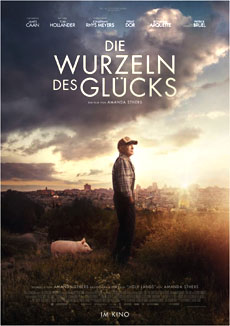France | Belgium 2017
Opening September 5, 2019
Directed by: Amanda Sthers
Writing credits: Amanda Sthers
Principal actors: James Caan, Tom Hollander, Jonathan Rhys Meyers, Rosanna Arquette, Efrat Dor
 Metaphorically, “holy lands” refer to its three themes: families, religion, and countries. In Holy Lands, each topic is divided into numerous subtopics and characters. Themes: Countries: Belgium, USA, Israel. Religion: Ashkenazi Judaism, Catholicism. Families: unapologetic Harry/ James Caan, estranged retired New York City doctor now raising pigs, son David / Jonathan Rhys Meyers, dramatist and detached, daughter Annabelle / Efrat Dor, parents-dependent financially, and ex-wife Monica / Rosanna Arquette; in Nazareth, Rabbi Moshe / Tom Hollander, vehement opposer of the foul pig farm, patient wife Rivka / Reem Kherici, and four sons. Harry follows civil law, Moshe religious belief, and a crazy Belgium priest (Loai Nofi) his current conviction. Stereotypes include: son is gay, daughter is neurotic, melodramatic religious motifs, as well as two-dimensional political characterizations. A performance of David’s play is continually revisited; there is a plausible correlation to Edgar Lee Masters’ Spoon River Anthologies, 1915.
Metaphorically, “holy lands” refer to its three themes: families, religion, and countries. In Holy Lands, each topic is divided into numerous subtopics and characters. Themes: Countries: Belgium, USA, Israel. Religion: Ashkenazi Judaism, Catholicism. Families: unapologetic Harry/ James Caan, estranged retired New York City doctor now raising pigs, son David / Jonathan Rhys Meyers, dramatist and detached, daughter Annabelle / Efrat Dor, parents-dependent financially, and ex-wife Monica / Rosanna Arquette; in Nazareth, Rabbi Moshe / Tom Hollander, vehement opposer of the foul pig farm, patient wife Rivka / Reem Kherici, and four sons. Harry follows civil law, Moshe religious belief, and a crazy Belgium priest (Loai Nofi) his current conviction. Stereotypes include: son is gay, daughter is neurotic, melodramatic religious motifs, as well as two-dimensional political characterizations. A performance of David’s play is continually revisited; there is a plausible correlation to Edgar Lee Masters’ Spoon River Anthologies, 1915. The film is so complicated and disjointed it takes concentration to follow. French writer-director Amanda Sthers (Madame, 2017) obviously loves her novel that the film is based on, Les Terres Saintes; even the editor (uncredited) could not save it. Turgidly anachronistic, Sthers’ screenplay snubs reality and lacks focus; the cutout characters generate audience apathy. Certain traits Sthers’ highlights in the script, e.g., Annabelle reading Harry’s private mail, are unsettling.
Holy Lands does sparkle within the framework of Harry and Moshe’s association: the intrinsically unhappy, antagonistic cardiologist and the worldly, drolly sagacious Rabbi. Thanks to Caan and Hollander’s performances, those scenes merge humor, understanding, balanced innuendos, and wit. Unobtrusively inserting some family dysfunction could have worked then, if Sthers’ had stayed in the Holy Land. Hence, it was refreshing to hear “Smile,” Charlie Chapman’s song (Modern Times, 1936) heralding end credits. 100 minutes ()
